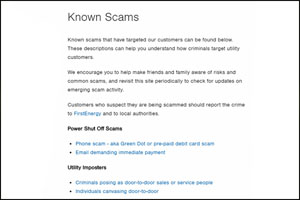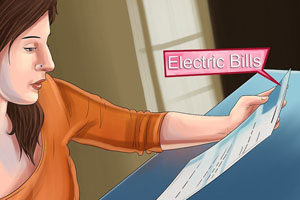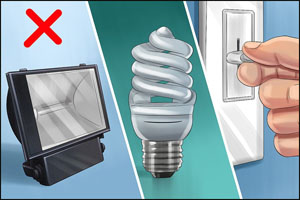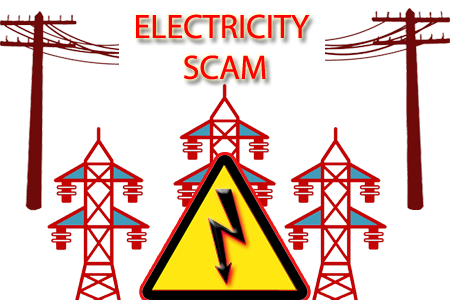Electricity Scams
Beware of electricity frauds or doorstep electricity meter credit scams trying to get your money—it often involves being offered reduced energy bills. With trust being an imperative commodity in this highly competitive market, almost every supplier is trying to gain attention by offering the cheapest deals on utility energy. As with anything good, there are con artists preying on your hard-earned money. Not only have these electricity scams appeared in the form of utility bills, but also through common broker scams offering discounts and reductions. Always look out for these fraudsters and stay away. Sources say that more than 110,000 households have already been affected by this crime—don't add to
this number by becoming a victim. Having said that, as a matter of fact, business energy is also, unfortunately, vulnerable to these issues. Although a large group of members—whether dealers, brokers, or consultants—are candid, highly regarded, and focused on getting a fair deal, there are psychic and clairvoyant crooks who will try to deceive you into an energy deal that benefits only them.
Electricity scams encompass various deceptive schemes aimed at exploiting consumers in relation to their electricity usage and bills. One prevalent tactic involves door-to-door impostors posing as utility company representatives, pressuring homeowners to allow access for meter checks or even demanding immediate payment for fictitious outstanding balances. Another scam involves fraudulent telemarketing calls or emails, offering fake discounts or promotions on electricity rates, leading to unauthorized access to personal information or payment details.
Additionally, there are instances of counterfeit prepaid electricity cards being sold, leaving consumers with unusable or fake credits.
To protect against these scams:
-
Verify the identity of anyone claiming to represent a utility company.
-
Never make immediate payments or disclose personal information.
-
Report any suspicious activity to local authorities or your utility provider.
Staying vigilant and informed is key to thwarting these deceitful practices and ensuring the security of your electricity service.
How electricity scam works?
You will receive an email all of a sudden from con artists claiming to be from a reputable utility company, notifying you that you owe money for a particular year’s energy usage.
The Green Dot card scam – a new money-moving technique of choice for scammers. By making use of fake government credits as capital for a 419 scam (also known as an advance fee scam), the fraudsters issue counterfeit grant checks and then tell victims they must pay off a bill by reloading their debit cards.
Electricity scams typically operate through deceptive tactics aimed at exploiting consumers' concerns about their electricity bills and usage. One common method involves fraudulent door-to-door representatives posing as utility company employees. They may use aggressive tactics to gain access to a residence, claiming they need to check the meter urgently or demanding immediate payment for purported outstanding balances. In reality, they have no affiliation with the legitimate utility provider and may tamper with meters or install counterfeit ones, leading to inaccurate readings and potentially higher bills.
Another approach involves fake telemarketing calls or emails, promising discounted rates or special promotions on electricity. They request personal information or payment details to process the supposed savings. Victims who provide this information risk identity theft or unauthorized charges. Additionally, counterfeit prepaid electricity cards may be sold, leaving consumers with unusable credits and monetary losses.
To protect against these scams, it's crucial to verify the identity of anyone claiming to represent a utility company, and never provide personal or financial information over the phone or in person. Legitimate utility companies typically communicate through official channels and do not request immediate payments in person. If suspicious activity is encountered, it should be reported to local authorities or the utility provider.
Staying vigilant and informed is essential in preventing falling victim to these deceitful practices.
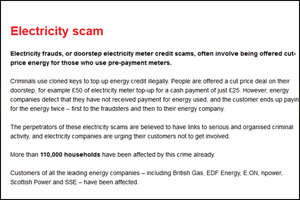
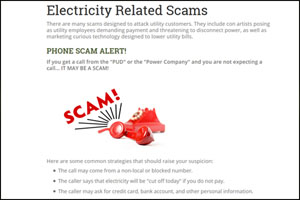
How to identify these criminals who target utility customers?
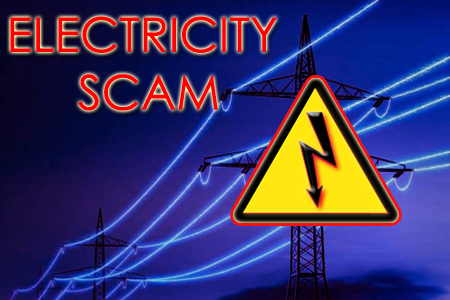
There's no such thing as free energy. Before you even say 'yes' to have anything installed on your energy supply, understand what you are purchasing and at what cost. Be wary of anyone requesting specific payment methods or asking for your bank information. Exercise caution by all means and report it to your electricity company. You can also call up your local law enforcement or file a complaint with the FTC if you are a victim of an electricity scam.
Identifying criminals who target utility customers requires vigilance and awareness. Legitimate utility company representatives always carry proper identification and will readily provide it upon request. Be cautious of anyone who hesitates or refuses to show credentials. Genuine employees also typically arrive in marked company vehicles. If someone shows up unannounced without proper identification or an official vehicle, it's a red flag. Additionally, be wary of high-pressure tactics or urgent demands for payment. Authentic utility providers do not insist on immediate payments in person. Verify any suspicious visit or communication by contacting the utility company using official contact information from a trusted source, such as your monthly bill or the company's official website. Report any encounters with suspicious individuals to local law enforcement and the utility company. By remaining vigilant and following these precautions, you can help protect yourself and others from falling victim to utility customer-targeting criminals. Remember, your safety and security should always come first.
